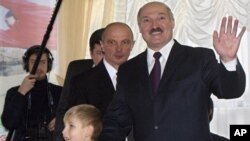Belarusians voted Sunday in a presidential election that seems destined to add another five years to President Lukashenko's 16-year rule.
Wearing fur hats and bulky overcoats, voters turned out to vote in one of Belarus' shortest and coldest days of the year.
Opposition claims fraud
Even before the polls opened, a monitoring group supported by opposition parties said the government had committed fraud by tampering with ballots cast during five days of early voting.
Sergey Kalyakin chairs the monitoring group "For Fair Elections in 2010.”
He said that his group received numerous reports that voting station directors did not seal voting boxes and protect them from tampering by government officials.
Over 99 percent of poll-watchers were appointed by the government. About 1,000 foreign election observers were registered in Belarus.
About 10 percent of votes were cast early, according to the election commission.
Pre-election polls indicated that there could be enough support for the nine opposition candidates to deny President Lukashenko a first round victory of 50 percent, plus one vote.
Different views on Lukashenko
Opposition presidential candidate Andrei Sannikov told VOA after voting Sunday that a lot of Belarusians – he would say the overwhelming majority -- wants change."
But Galina Sergeyevna, a teacher of management, who voted at the same poling station as Sannikov, say that she likes Mr. Lukashenko's gradual approach to change and that she appreciates the peace and quiet of her nation.
Ivan, a 24-year-old shop assistant, said he, too, supports Lukashenko, but would like to see a faster integration of Belarus, a country of 9.6 million wedged between Poland and Russia, with Europe and the US.
Old ways deeply ingrained
Urbana Mikhailovna, another teacher, agrees with those who say Belarus needs change, but sees it hard to come by as the government, as she said, controls the entire electoral machinery here.
Stanislav Shushkevich, who led Belarus for two years after it broke away from a collapsing Soviet Union in 1991, shared this pessimism about change in an interview with VOA on Saturday. He said that the current government operates by “old methods,” adding that this mean a complete falsification if the electoral process.
Lukashenko’s rise and style
In 1994, Shushkevich held what are widely seen as Belarus' first free presidential elections. Lukashenko won that election and subsequently amended the constitution to extend his term in office. In 2006, he won re-election in a vote that was deemed undemocratic.
On Sunday, Lukashenko vehemently denied fraud charges during a 17-minute press conference aired at midday on national television.
Speaking after voting in a sports school, the burly leader said any question of fraud would be decided by the state election commission. Asked why he was appearing on television after campaigning officially ended on Saturday, he said that the nation would like to see what their president was doing.
Asked if he will talk with the opposition after the election, he replied that he would not talk to what he called "bandits and diversionaries.”
He added that he would talk with normal opposition figures, those who shared his goal of a "peaceful, beautiful, quiet Belarus."
Status quo likely to remain
Not everyone voted Sunday. Mila, an English teacher, said that voting does not change anything.
"There won't be any impact. Everything will be exactly the same."
Asking that her last name not be used, she hurried home past October Square, the site of the planned opposition protest.
Belarus Strongman Lukashenko Expected to Win Re-Election
- By James Brooke




